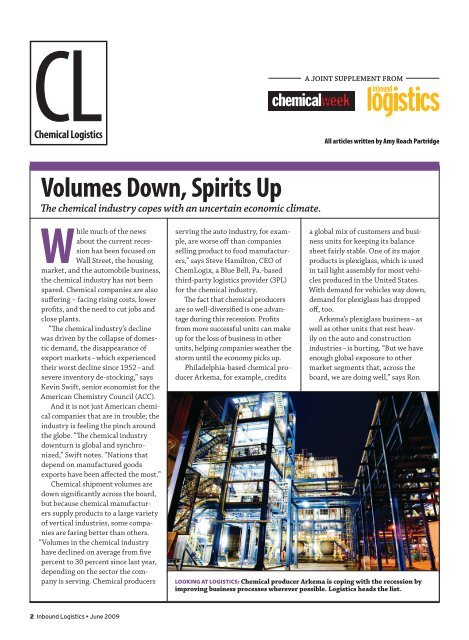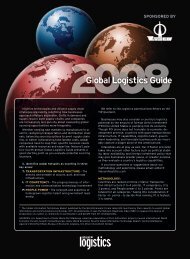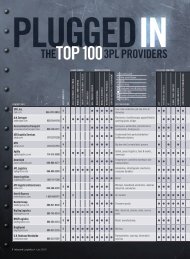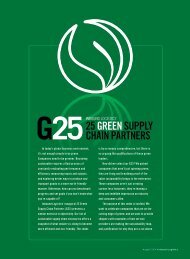Chemical Logistics - Inbound Logistics
Chemical Logistics - Inbound Logistics
Chemical Logistics - Inbound Logistics
Create successful ePaper yourself
Turn your PDF publications into a flip-book with our unique Google optimized e-Paper software.
CL<br />
<strong>Chemical</strong> <strong>Logistics</strong><br />
A JOINT SUPPLEMENT FROM<br />
All articles written by Amy Roach Partridge<br />
Volumes Down, Spirits Up<br />
The chemical industry copes with an uncertain economic climate.<br />
While much of the news<br />
about the current recession<br />
has been focused on<br />
Wall Street, the housing<br />
market, and the automobile business,<br />
the chemical industry has not been<br />
spared. <strong>Chemical</strong> companies are also<br />
suffering – facing rising costs, lower<br />
profits, and the need to cut jobs and<br />
close plants.<br />
“The chemical industry’s decline<br />
was driven by the collapse of domestic<br />
demand, the disappearance of<br />
export markets – which experienced<br />
their worst decline since 1952 – and<br />
severe inventory de-stocking,” says<br />
Kevin Swift, senior economist for the<br />
American Chemistry Council (ACC).<br />
And it is not just American chemical<br />
companies that are in trouble; the<br />
industry is feeling the pinch around<br />
the globe. “The chemical industry<br />
downturn is global and synchronized,”<br />
Swift notes. “Nations that<br />
depend on manufactured goods<br />
exports have been affected the most.”<br />
<strong>Chemical</strong> shipment volumes are<br />
down significantly across the board,<br />
but because chemical manufacturers<br />
supply products to a large variety<br />
of vertical industries, some companies<br />
are faring better than others.<br />
“Volumes in the chemical industry<br />
have declined on average from five<br />
percent to 30 percent since last year,<br />
depending on the sector the company<br />
is serving. <strong>Chemical</strong> producers<br />
serving the auto industry, for example,<br />
are worse off than companies<br />
selling product to food manufacturers,”<br />
says Steve Hamilton, CEO of<br />
ChemLogix, a Blue Bell, Pa.-based<br />
third-party logistics provider (3PL)<br />
for the chemical industry.<br />
The fact that chemical producers<br />
are so well-diversified is one advantage<br />
during this recession. Profits<br />
from more successful units can make<br />
up for the loss of business in other<br />
units, helping companies weather the<br />
storm until the economy picks up.<br />
Philadelphia-based chemical producer<br />
Arkema, for example, credits<br />
a global mix of customers and business<br />
units for keeping its balance<br />
sheet fairly stable. One of its major<br />
products is plexiglass, which is used<br />
in tail light assembly for most vehicles<br />
produced in the United States.<br />
With demand for vehicles way down,<br />
demand for plexiglass has dropped<br />
off, too.<br />
Arkema’s plexiglass business – as<br />
well as other units that rest heavily<br />
on the auto and construction<br />
industries – is hurting. “But we have<br />
enough global exposure to other<br />
market segments that, across the<br />
board, we are doing well,” says Ron<br />
Looking at logistics: <strong>Chemical</strong> producer Arkema is coping with the recession by<br />
improving business processes wherever possible. <strong>Logistics</strong> heads the list.<br />
2 <strong>Inbound</strong> <strong>Logistics</strong> • June 2009

















